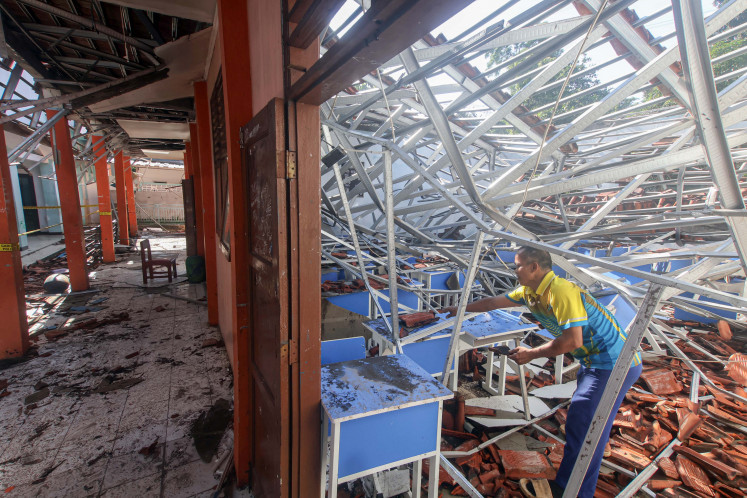Popular Reads
Top Results
Can't find what you're looking for?
View all search resultsPopular Reads
Top Results
Can't find what you're looking for?
View all search resultsLearning from Bishkek: Rowing between two rocks
This past week, ethnic tensions and political discontent fully escalated into widespread violence and major political turmoil in Kyrgyzstan
Change text size
Gift Premium Articles
to Anyone
T
his past week, ethnic tensions and political discontent fully escalated into widespread violence and major political turmoil in Kyrgyzstan.
In stark contrast to the nine victims of the Gaza-bound Mavi Marmara vessel, Indonesian solidarity and support for 176 dead, 1,870 injured and more than a quarter million displaced is practically nonexistent for Kyrgyzstan (BBC News, June 16). Indonesians' embrace of "international solidarity" is certainly amusing.
Indonesia has much to learn from the unfolding of events leading to the crisis in Kyrgyzstan, however, national media coverage had been lukewarm, doing nothing more than simply reporting the number of casualties as well as the exchange of statements between parties involved. Even worse, experts, scholars, as well as diplomats are looking the other way, refusing to comment, and pretending not to see the massacre unfolding.
The fact remains; very few Indonesian can correctly spell Kyrgyzstan, and even less are sincerely concerned about the crisis taking place. Unfortunately, Jakarta has too much in common with Bishkek and successfully learning from their crisis will be greatly beneficial to us in the future. Indonesia should put Kyrgyzstan's domestic as well as international situation under greater scrutiny.
Domestically, Bishkek, a secular Muslim-majority country where religion has a growing "soft" influence in politics, has a southern region that is ethnically divided from the rest of the country.
The tide of events showed that it did not take long for the divide to crumble under the pressure of political factionalism and small episodes of violence.
Such a divide, unfortunately, resembles the divide between western and eastern Indonesia, where the majority of Indonesia's non-Javanese and non-Muslims reside. Domestic political analysis indicates weak governance, crisis of legitimacy, as well as extensive corruption behind the Kyrgyzstan unrest, factors that should be viewed with greatest caution in Indonesia.
Internationally, the crisis is then further exacerbated by the failure of Bishkek to successfully hedge between US and Russian interest. It was Indonesia's Mohammad Hatta that coined the term "rowing between two rocks".
However, rowing between two rocks is not as easy as it seems and in the event of failure, as the case of Kyrgyzstan suggests, it might leave your ship's hull ripped apart.
Kyrgyzstan, a country located between a rock and a hard place, speaks volumes for the multi-polar world that we live in today. It is indeed a country with sovereignty and international recognition, yet at the same time it is also part of a larger stage called "the new great game", a stage set for geopolitics and energy politics, where an aging US, a rising China and a returning Russia is sure to flex their international "muscles".
Like it or not, Indonesia in the future will also be placed in a similar strategic position between both an aging US and a rising China.
Indonesians seem to be proud of our "million friend diplomacy", a term coined by Indonesian President Susilo Bambang Yudhoyono in one of his speeches, attempting to navigate between strategic partnerships with the US while at the same time accommodating China's rise. Optimism is beneficial, but caution is of utmost importance.
Domestic political factionalism, mobilized ethnic tension and governance failure does matter. However, major power politics promises itself to be the main factor further exacerbating and prolonging the unrest.
The upcoming US airbase lease renewal negotiations scheduled in July 2010, as well as Russia's refusal to immediately quell escalating violence, both indicated that geopolitical strings are present and can be traced back as far as Moscow and Washington.
Many ponder the reason behind Russia's refusal to send troops into Kyrgyzstan despite their continuous plea for help. The condition is undeniably worsening and a humanitarian catastrophe is surely in the making, yet Moscow argues that it could not participate in what it considers to be an "internal conflict".
Such reasoning is not only flawed but also remarkably weak, especially for a country that had dismembered and invaded neighboring Georgia using its overwhelming military prowess in the past without any signs of hesitation.
The Congressional Research Service (CRS) documents prepared for the US congress indicated that the US airbase, also known as the Manas Transit Center, supporting US operations in Afghanistan, is suspected to be the reason behind Moscow's orchestration of the coup in Kyrgyzstan last April.
During the April 2010 coup, through its media campaign as well as energy deal cutbacks, Moscow played a major role in instigating antigovernment sentiments and protests, culminating in political turmoil for Bishkek.
Kyrgyzstan's past ruling governments have repeatedly accepted generous Russian aid but have betrayed Russian interest whenever a better offer comes from the US. Bishkek's policy of vulgar hedging between US and Moscow backfired and instigated Moscow's retaliation. Russia is postponing its military support in order to showcase its influence and possibly to penalize Kyrgyzstan's past repeated actions that hurt Russian interests.
One thing is certain for Moscow, should Bishkek refuse to dance to its tune, it has the option to strangle it with the very strings it uses to make it dance. Kyrgyzstan's refusal to solicit help from the US, stating that Russia is its main "strategic partner", is just their euphemistic way of saying "we get it, Moscow".
So will Indonesia find itself entangled between China and US in the future or can we learn from the mistakes of others? When such a crisis does befall us, will the world look the other way, just as we have ignored the crisis in Kyrgyzstan?










